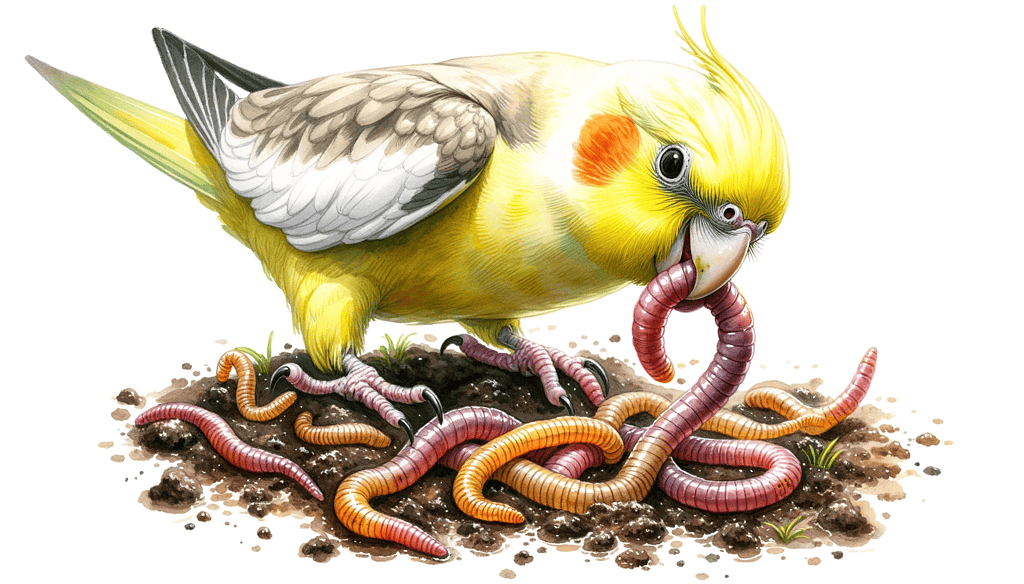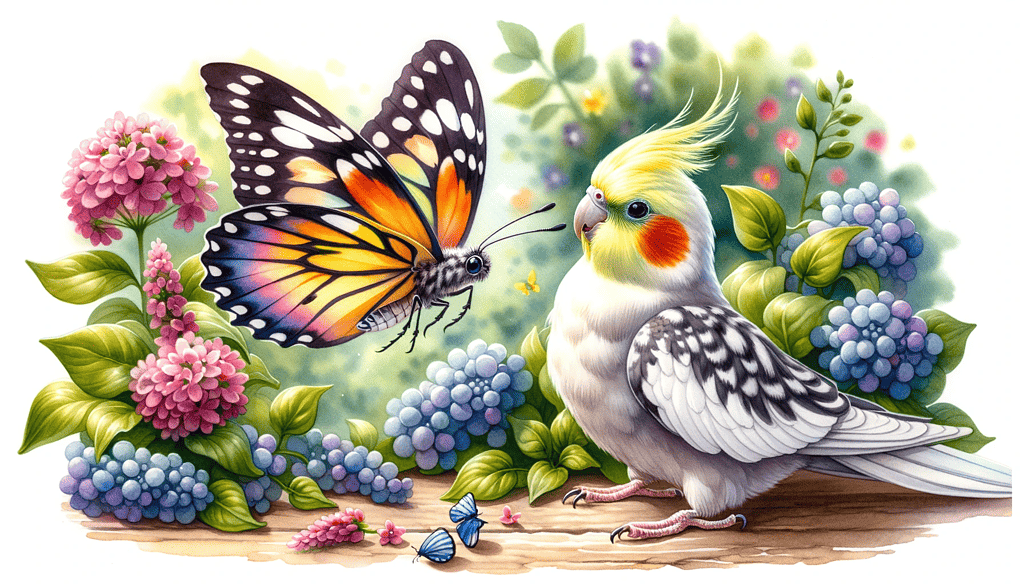
Cockatiels have a wide range of dietary needs to keep them chirping and cheerful. Their meals stretch beyond the seeds, pellets, and occasional fruit slices. Venturing into the dietary realm of cockatiels, one quickly discovers the extensive variety they can enjoy, especially when it comes to insects. This facet of their diet not only nourishes them but also tickles their natural instincts, making mealtime an engaging experience.
As a general rule, a cockatiel’s insect diet can comprise crickets, mealworms, and grasshoppers, which provide essential proteins and nutrients, enriching their overall health and mirroring their wild counterparts’ diet closely. It’s crucial to offer them in moderation and ensure they’re the appropriate type.
Dive deeper with us as we flutter through the fascinating world of a cockatiel’s insect diet from a vet’s lens. Unveiling the nutritional intricacies and preparing a safe bug banquet for your feathered companion awaits!
Do Cockatiels Eat Insects?
Yes, they do, but with some considerations. Insects are an excellent source of protein for cockatiels. However, the type of insect and the manner in which it’s served makes a world of difference. I’ve realized the importance of picking feeder insects with high protein and low-fat content. It’s fascinating how these little critters can pack a punch of nutrients that are beneficial for cockatiels.
- My recommendation is to use frozen or dead insects. The frozen varieties ensure any parasites are eliminated, providing a safe meal for your cockatiel.
- The frequency at which you serve insects should be moderated. Insects should be fed as a treat and in moderation, 2x per week at most. Too much of anything is never good, and the same holds for the insect diet of cockatiels.
- Overfeeding insects can lead to obesity and other health issues in your bird. It’s all about creating a balanced diet.
Can Cockatiels Eat Crickets?
Yes, cockatiels can eat crickets, and introducing them into their diet can be a step towards providing a varied nutritional regimen for your feathered friend. It’s advisable to start with a small amount, like one or two crickets, to gauge your bird’s reaction as some may take to crickets right away while others might be hesitant.
- Crickets generally have a good nutritional content which makes them a suitable occasional treat for your cockatiel. The protein, the vitamins, and the minerals – it’s like a mini health package with legs.
- The way you serve them matters. Frozen or freshly dead crickets are the way to go to avoid any unwanted parasitic guests.
Can Cockatiels Eat Mealworms?
Yes, cockatiels can eat mealworms, and many find them enjoyable. Mealworms are often used by bird enthusiasts to provide their pets with a protein boost. They’re not just safe; they’re a treasure trove of nutrients. When it comes to nutritional content, mealworms are pretty much a powerhouse.
- They are rich in protein and fiber, with a fair share of fat. The protein helps in feather growth and repairs, the fiber aids digestion, and the fat provides the necessary energy.
- The fat content is something to keep an eye on, to ensure you’re not overfeeding your cockatiel with mealworms. Moderation is key.
Can Cockatiels Eat Ants?
Ants are fascinating creatures with over 12,000 different kinds found worldwide. When it comes to sharing these tiny morsels with your cockatiel, it’s a whole different ball game. Feeding them to your cockatiel is not a good idea. Ants can carry diseases and parasites which can be harmful to your bird.
Precautions to Consider When Feeding Ants to Cockatiels:
- Disease and Parasite Transmission: Ants can be carriers of diseases and parasites, posing a significant health risk to your cockatiel. It’s prudent to steer clear of feeding wild ants to your bird.
- Venomous Stings: Some ant species possess venomous stings that can cause severe discomfort or allergic reactions in cockatiels. It’s always better to err on the side of caution.
- Formic Acid: Certain ants excrete formic acid, which can be irritating or harmful to your bird. This is a nature’s way of telling us to look for alternative food options.
- Aggressive Defense: Ant colonies are known for their aggressive defense mechanisms, which can be harmful to your cockatiel. A swarm of angry ants is the last thing your pet needs.
- Alternative Protein Sources: Instead of ants, consider safer protein-rich alternatives like commercial bird pellets, mealworms, or even a slice of hard-boiled egg. These options are not only nutritious but also come without the risks associated with feeding ants.
Can Cockatiels Eat Grasshoppers?
Yes, cockatiels can eat Grasshoppers. They are not only a source of protein but also provide a gamut of essential nutrients, making them a potentially beneficial addition to your cockatiel’s diet. When served correctly, grasshoppers can morph into a crunchy delight for your bird, offering not just nutrition but a hint of hunting simulation as well.
I’ve often witnessed the sheer joy a cockatiel exhibits when presented with a grasshopper. However, it’s paramount to tread this path with caution, ensuring the grasshoppers are free from any harmful substances and are served in moderation as part of a well-rounded diet.
Can Cockatiels Eat Caterpillars?
Yes, cockatiels can eat caterpillars. In the wild, a cockatiel might snack on a caterpillar crawling on leaves. However, when it comes to feeding caterpillars to captive cockatiels, there are safety precautions that need adherence.
- Caterpillars may consume leaves from poisonous plants which in turn can harm your cockatiel.
- Some caterpillars have toxic hairs or spines as a defense mechanism against predators.
- A novice bird owner might find it challenging to source safe caterpillars.
Through my years of veterinary practice, I’ve seen how an innocent-looking caterpillar can cause distress to a cockatiel if not chosen wisely.
Can Cockatiels Eat Beetles?
Cockatiels can indeed consume beetles as part of their diet. Cockatiels, both in the wild and in captivity, have been observed to eat beetles. For cockatiels, beetles come in various sizes, many of which are ideally suited for being swallowed whole.
- A common way for a cockatiel to encounter a beetle is in its seed, as bugs like saw-toothed grain beetles, rust-red flour beetles, and grain weevils can infest bird seeds. Therefore, it’s safe to say that cockatiels can eat beetles, but as with all foods, it’s essential to ensure they are safe and free from pesticides or other harmful substances.
- Beetles, like other insects, are a good source of protein which is essential for your cockatiel’s feather health and muscle development. They can add variety to your cockatiel’s diet, which can be stimulating and enriching for them.
Can Cockatiels Eat Butterflies and Moths?

Yes, cockatiels can indeed eat Butterflies and Moths, and in the wild, they sometimes consume them for protein and energy.
- Butterflies: Wild cockatiels do eat butterflies occasionally. However, certain species of butterflies, like the pipeline swallowtail and the monarch butterfly, can be harmful because they consume toxic plants. Most butterfly species use mimicry and other self-defense techniques, making them less appealing as food. Larger varieties might be consumed, but many cockatiels might just observe them without eating.
- Moths: Moths serve as an important food source for cockatiels. They are smaller than butterflies, making them more likely to be eaten. Moths provide protein and a small amount of vitamins. If sourced from reputable places, dried moths can be a good snack for cockatiels.
Below is a table demarcating the differences, similarities, and safety considerations of feeding butterflies and moths to cockatiels:
| Aspect | Butterflies | Moths | Safety Considerations for Cockatiels |
| Nutritional Value | Moderate protein content | Higher protein content | Ensure insects are free from pesticides and chemicals. |
| Digestibility | Easily digestible | Easily digestible | Avoid overfeeding; moderation is key. |
| Allergenic Potential | Low | Low | Observe your bird for any adverse reactions. |
| Availability | Seasonal | More readily available | Opt for reputable sources to avoid contaminated insects. |
| Chitin Content | Moderate | Moderate to High | Too much chitin can be hard on a cockatiel’s digestive system. |
| Potential Health Risks | Risk of pesticide contamination | Risk of pesticide contamination | Always source insects from reliable and organic suppliers. |
The Importance of Insects in a Cockatiel’s Diet
Transitioning from the fluttery world of butterflies and moths, it’s imperative to broaden the scope and comprehend the pivotal role insects play in a cockatiel’s nutritional tapestry.
Why Insects?
Insects are a treasure trove of essential nutrients that significantly contribute to the overall well-being of cockatiels. They serve as a natural source of protein, aiding in muscle development and feather growth.
Benefits of Including Insects in a Cockatiel’s Diet:
- Protein Punch: Insects are a powerhouse of protein which is indispensable for robust feathers and muscle growth.
- Vitamin Vault: Laden with essential vitamins such as A, D, E, and K, insects help in bolstering the immune system and ensuring a vibrant plumage.
- Mineral Mine: Rich in minerals like calcium and phosphorus, insects contribute to a strong skeletal framework.
- Natural Behavior: Feeding insects satiates the innate insectivorous tendencies of cockatiels, making them feel right at home.
- Digestive Aid: The chitinous exoskeleton of insects promotes digestive health by providing necessary fiber.
Insects to Avoid
Not all insects are created equal, especially when it comes to your cockatiel’s diet. Here’s a bullet list of insects to steer clear from, along with explanations on their harmful effects:
- Flies: Known carriers of diseases and bacteria.
- Toxic Butterflies: Certain species contain harmful toxins that can be fatal to cockatiels.
How to Safely Introduce Insects to Your Cockatiel’s Diet
Transitioning towards a new dietary element requires a careful approach to ensure the well-being of your cockatiel.
Choosing the Right Insects
Selecting high-quality insects is crucial to avoid any adverse effects on your cockatiel’s health. It’s advisable to stick to the safe insects and avoid any wild-caught insects that might carry diseases or harmful chemicals. Purchase from reputable sources to avoid contaminants.
Preparing and Serving Insects
Ensuring the insects are clean and fresh is paramount. Cleanliness and preparation method play a vital role in making insects a safe and enjoyable treat for your cockatiel. Here’s a step-by-step guide on how to prepare and serve insects to your cockatiel:
- Source High-Quality Insects: Purchase insects from reputable pet stores or breed them yourself to ensure they are free from diseases and chemicals.
- Clean the Insects: Rinse the insects thoroughly under running water.
- Preparation: You can serve insects live, dried, or cooked. However, live insects provide a natural hunting experience for your cockatiel.
- Serving: Place the insects in a shallow dish and introduce it to your cockatiel. Observe their reaction and adjust the quantity and frequency accordingly.
- Monitoring: Observe your cockatiel’s reaction to ensure they are enjoying their new treat without any adverse reactions.
- Consultation: If in doubt, consult with an avian vet to get personalized advice on serving insects to your cockatiel.
Conclusion
Cockatiels can consume insects and benefit from them nutritionally, so it’s crucial to offer them in moderation and ensure they’re the appropriate type. A well-rounded diet, encompassing fresh fruits, vegetables, and premium pelleted food, is vital for the optimal health of your cockatiel. By providing the right nourishment and attention, your cockatiel will flourish, becoming a delightful and cherished companion for many years.
If this article has added value to your cockatiel care regimen, do share it with fellow bird enthusiasts. Let’s continue to explore and share knowledge, ensuring our feathered friends thrive in the companionship they share with us.
